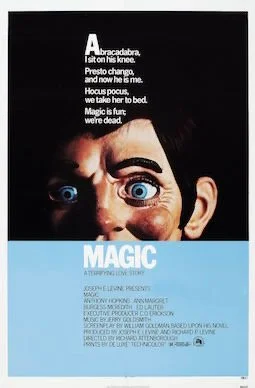Director: Richard Attenborough
Cast: Anthony Hopkins, Ann-Margret, Burgess Meredith, Ed Lauter
Have I Seen it Before: Never. A Cabin movie, but one I only pushed for after seeing Siskel and Ebert (mostly; Roger had some reservations) about it on and old episode of their show).
Did I Like It: Yes, to a point. Hopkins is exceptionally effective as both ventriloquist and dummy, made all the better as before The Silence of the Lambs (1991), he didn’t feel the need to play “Anthony Hopkins, certified movie maniac.” This is a role which—had it been made after Lambs—would have lent itself to a typical Hopkins schtick. It’s a shame that all too often he has to play similar characters now, but there is not an ounce of self-consciousness here. For someone who made large parts of his fame and fortune off of the personae of a gleeful killer, it is an interesting counterpoint to see him play someone who is as horrified—if not more so—than the audience by the increasing violence in his life. He even manages to evoke a pretty competent ventriloquist, which is no mean feat for someone who hasn’t spent years training for that type of performance. I’ll allow for the possibility that some of this was accomplished via ADR, so at worst, the sound editors did a superlative job. Burgess Meredith and Ann-Margret do end up playing only slight variations on their established screen personae, but I would be hard pressed to say having them around in a movie hurts the proceedings
The plot, however, is where I’m left with something of bad taste in my mouth. There’s the final moments when Peggy (Margret) returns to the cabin, which feels too cute of an ending for my taste, but I’m willing to forgive that. I think the moment might have been more effective had we seen her re-enter the Cabin (and just before she could give voice to her horror) or just before she started saying anything and we see her walking into the cabin might have been more effective.
What I really have a problem with is two scenes that are positively load-bearing on the plot. In the key encounter where Greene (Meredith) tells Corky that if he can go without the dummy for five minutes, then he doesn’t need help, Corky can’t make it thirty seconds, indicating an undercurrent of compulsion in his psychosis. Later on, Corky takes a ride in a fishing boat with Duke (Ed Lauter) and can go without Corky for several scenes which are just as harrowing and stressful for the man. The plot is double dealing, and even if I could blame only William Goldman*, but Attenborough was certainly within his rights to make even the psychotic logic of that a little more cogent.
*Man, between this and my review for The Princess Bride (1987), these reviews are quickly becoming a microcosm of a feud with Goldman. I probably need to cleanse the system and take in Misery (1990) as quickly as possible.

